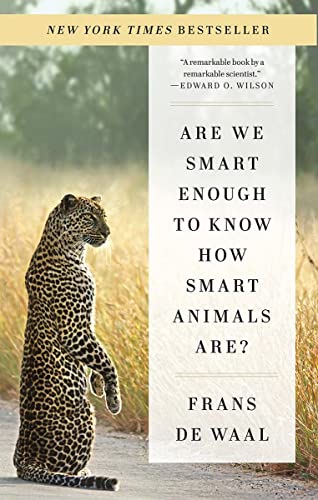Try Blinkist to get the key ideas from 7,500+ bestselling nonfiction titles and podcasts. Listen or read in just 15 minutes.
Start your free trial
Blink 3 of 8 - The 5 AM Club
by Robin Sharma

Are We Smart Enough to Know How Smart Animals Are? by Frans de Waal delves into the intelligence of various animal species and challenges our traditional views of human exceptionalism. It offers a thought-provoking exploration of animal cognition.
In Are We Smart Enough to Know How Smart Animals Are? by Frans De Waal, we embark on a journey to understand the intelligence of animals. De Waal, a renowned primatologist, challenges the traditional view that humans are the only intelligent species. He argues that we have been underestimating the cognitive abilities of animals, and that we need to reassess our understanding of animal intelligence.
De Waal begins by discussing the concept of animal cognition, highlighting the various ways in which animals demonstrate intelligence. He presents examples of animals using tools, solving complex problems, and exhibiting social intelligence. He also emphasizes the importance of considering the evolutionary context of animal intelligence, suggesting that it is shaped by the specific ecological and social challenges each species faces.
Next, De Waal delves into the comparison between human and animal intelligence. He argues that while humans possess unique cognitive abilities, such as language and advanced symbolic thinking, animals exhibit their own forms of intelligence that are equally remarkable. For instance, he discusses the sophisticated communication systems of bees and the remarkable memory of elephants.
De Waal also challenges the notion that intelligence is a single, linear scale, with humans at the top. Instead, he suggests that intelligence is multifaceted, and different species excel in different cognitive domains. He introduces the concept of “animal cognition without human measures,” emphasizing the need to appreciate animal intelligence on its own terms.
The book then takes us through a series of fascinating studies on animal cognition. De Waal shares insights from his own research on primates, highlighting their complex social structures and emotional lives. He also discusses studies on other animals, such as birds, dolphins, and octopuses, revealing their surprising cognitive abilities.
One particularly intriguing aspect of animal cognition that De Waal explores is the theory of mind – the ability to attribute mental states to oneself and others. He presents evidence suggesting that some animals, such as chimpanzees and dolphins, possess a rudimentary form of theory of mind, challenging the traditional view that this ability is unique to humans.
De Waal then turns his attention to the ethical implications of our understanding of animal intelligence. He argues that recognizing the cognitive complexity of animals has significant implications for their welfare. If we acknowledge that animals are sentient beings with rich cognitive and emotional lives, we have a moral obligation to treat them with respect and consideration.
He also discusses the implications of animal intelligence for conservation efforts, suggesting that a better understanding of animal cognition can help us develop more effective strategies for protecting endangered species and their habitats.
In conclusion, Are We Smart Enough to Know How Smart Animals Are? challenges us to reassess our relationship with animals. De Waal argues that our understanding of animal intelligence has been limited by anthropocentric biases, and that we need to adopt a more inclusive and respectful view of animal cognition. By doing so, we can not only gain a deeper appreciation for the diversity of life on Earth, but also take more ethical and effective actions to protect it.



Are We Smart Enough to Know How Smart Animals Are? by Frans De Waal challenges our assumptions about animal intelligence. Through engaging stories and scientific research, the book explores the cognitive abilities of various species and raises thought-provoking questions about our relationship with the animal kingdom.
Are We Smart Enough to Know How Smart Animals Are? (2016) by Frans De Waal explores the intelligence of animals and challenges our preconceived notions about their cognitive abilities. Here's why this book is worth reading:
It's highly addictive to get core insights on personally relevant topics without repetition or triviality. Added to that the apps ability to suggest kindred interests opens up a foundation of knowledge.
Great app. Good selection of book summaries you can read or listen to while commuting. Instead of scrolling through your social media news feed, this is a much better way to spend your spare time in my opinion.
Life changing. The concept of being able to grasp a book's main point in such a short time truly opens multiple opportunities to grow every area of your life at a faster rate.
Great app. Addicting. Perfect for wait times, morning coffee, evening before bed. Extremely well written, thorough, easy to use.
Try Blinkist to get the key ideas from 7,500+ bestselling nonfiction titles and podcasts. Listen or read in just 15 minutes.
Start your free trial
Blink 3 of 8 - The 5 AM Club
by Robin Sharma
What is the main message of Are We Smart Enough to Know How Smart Animals Are??
The main message of Are We Smart Enough to Know How Smart Animals Are? is that animals possess unique cognitive abilities and deserve our respect and understanding.
How long does it take to read Are We Smart Enough to Know How Smart Animals Are??
The reading time for Are We Smart Enough to Know How Smart Animals Are? varies depending on the reader's speed. However, the Blinkist summary can be read in just 15 minutes.
Is Are We Smart Enough to Know How Smart Animals Are? a good book? Is it worth reading?
Are We Smart Enough to Know How Smart Animals Are? is a thought-provoking read, shedding light on the complexity of animal intelligence and challenging our assumptions. It's definitely worth reading!
Who is the author of Are We Smart Enough to Know How Smart Animals Are??
The author of Are We Smart Enough to Know How Smart Animals Are? is Frans De Waal.